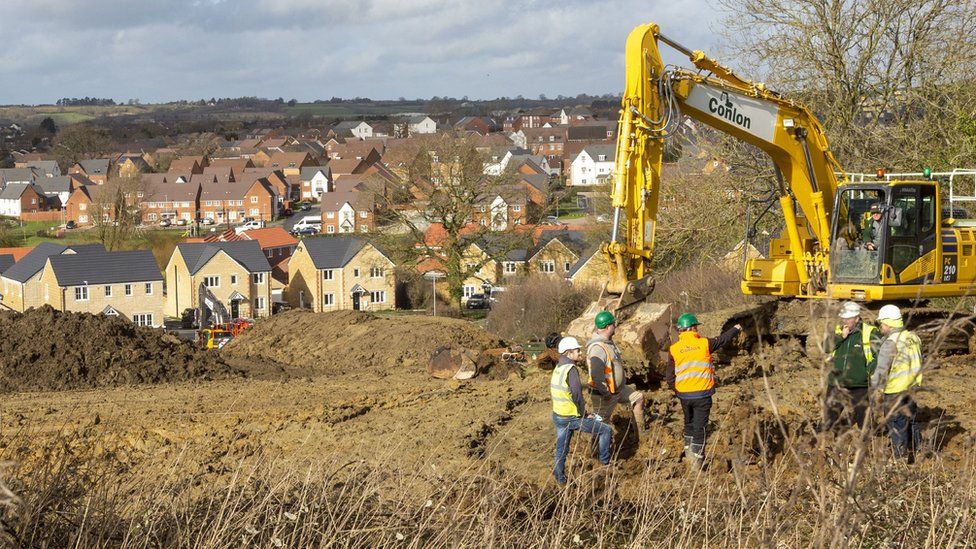ARTICLE AD BOX
 Image source, Getty Images
Image source, Getty Images
By Paul Seddon
Politics reporter
A backbench rebellion over the government's housebuilding plans has reopened Conservative divisions over housing targets.
Nearly 50 rebels are backing a plan to ban mandatory targets in England, prompting ministers to delay a vote scheduled for Monday.
The rebels argue government-set targets are excessive and undermine local councils.
But other Tories argue scrapping them would lead to fewer homes being built.
Housing Secretary Michael Gove is expected to meet rebels in an attempt to head off the rebellion, the first of Rishi Sunak's premiership so far.
Downing Street said it remains committed to scale up housebuilding in England overall to 300,000 homes a year by the mid-2020s.
Currently, local councils have to incorporate government-calculated housing need targets into their long-term housebuilding plans.
Where councils fail to keep these plans up to date, planning guidance makes it harder for them to block new developments.
Longstanding divisions on the issue have now been reignited because the government's Levelling Up Bill, making its way through Parliament, contains a number of planning proposals.
A group of 47 Tory MPs backed an amendment due to be debated on Monday that would ban government-calculated housing targets from influencing planning applications.
It would also scrap a current rule under which local councils have to maintain a rolling five-year stock of land for future development.
'Nimby councils'
The Tory MP behind the amendment, Theresa Villiers, said the targets were "undermining local decision-making" and "delivering excessive numbers in certain parts of the country".
"I completely agree we need new homes - but we need the right homes in the right places," the Chipping Barnet MP said.
She added that the government's overall 300,000 target was not "based on evidence" and needed to be reviewed.
Another rebel, Basingstoke MP Maria Miller, said ditching targets would put councillors "back into control" and ensure housing is built "where local communities want them".
But fellow Tory MP Simon Clarke, until recently the levelling up secretary under former prime minister Liz Truss, said scrapping all targets was "desperately short-sighted".
It would grant "carte blanche for Nimby [Not In My Back Yard] councils to say no to any more housebuilding in their localities", he argued.
He added it would deal a blow to those who want to get on the housing ladder, and be "a disaster socially, economically, and politically for the Conservative Party".
Will the 300,000 target be met?
The government's housebuilding target of 300,000 homes a year in England by the mid-2020s was unveiled by then chancellor Philip Hammond in November 2017 and appeared in his party's 2019 manifesto.
In 2019-20, there were 242,700 net additional dwellings, which fell to 216,490 in 2020-21, partly due to the pandemic.
Net additional dwellings is the government's headline figure for housebuilding, including houses being converted to flats or commercial buildings switching to domestic use, as well as new builds. It also factors in demolished houses.
The government has repeatedly had to stress its commitment to the target, with former housing secretary Robert Jenrick having cast doubt earlier this year on whether it could be met and Michael Gove also appearing to back away from it.
This is not the first time that the government's formula for calculating housing need, which is based on population predictions, has provoked anger from Tory backbenchers.
Boris Johnson's government abandoned a plan to tweak the formula in late 2020, after MPs representing southern seats complained it would place a disproportionate burden on their areas.
Tory rebels argue more needs to be done to prevent developers "land banking" by not building quickly enough on land where planning permission has been granted.
They have also tabled amendments to create stricter time-limits for such developers to start building, as well as tax penalties.

 2 years ago
30
2 years ago
30








 English (US) ·
English (US) ·